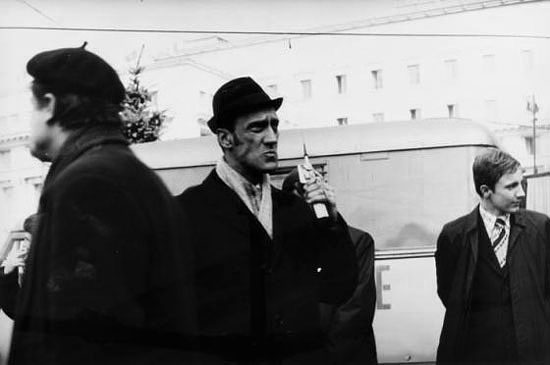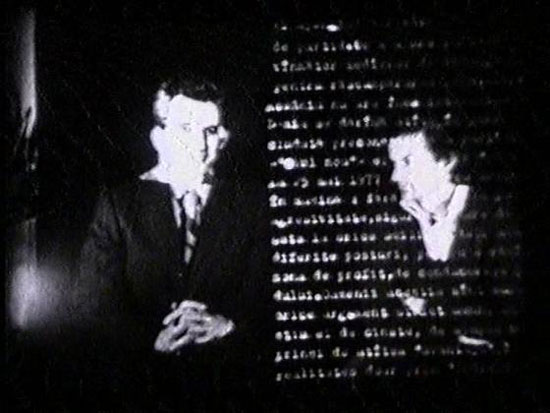Ion Grigorescu
(1945, RO)
Grigorescu is one of the very few multimedia artists in Romania who during the communist regime conducted visual research on the body: a taboo topic at the time. The artist’s body became work “material”—perceived as a “medium” and surface—onto which mental images are reflected. His body performances are to be seen as “post-happenings” with the emphasis no longer on the temporal dimension but rather on the photographic snapshot that, however, preserves a performative character. These works, like many others from the nineteen-seventies and eighties, would go public only much later.
Election meeting, 1975
6 photography (from a series of 28), b/w, 20 x 30 cm each
Courtesy: The Artist
Snapshots taken during a rally in Bucharest, with a camera hidden on the artist’s hip, catching Securitate agents supervising the crowd and contrasting this view with that of with the ordinary participants, who were relaxed, tired, or bored.

Dialogue with Ceauşescu, 1978
N8mm film / DVD, 7’ 11’’
In Dialogue with Ceauşescu the artist plays two opposing roles, in one of which he is wearing a mask with the face of Ceauşescu.

English translation of the texts used in the film:
„If the people cannot rule they should at least criticize!
I: In the last days you were speaking about the people’s content.
Ceauşescu : Yes, there is a content created by the stimulated consumption, sometimes by the lack. We are creating needs where the man is easiest to be scared – at food. However the country is hierarchized so that those who live in villages should be the most starved, but are accustomed to endure; their civilization, is it still existing, is not based on food, nor on other needs from today services. It’s simply a handicap with which we are fighting and will not be set on the progress way by equalizing the level of the country and the town. It is a matter of economic objective laws.
I: These ‘objective laws’ result from too simple speculation: who is exploited in the newest relations – the proletariat, would be destined to defeat exploitation and to be the future leader, but now reality changes: the proletariat is too bound to the bourgeoisie to invent something else than exploitation.
Ceauşescu: We are those who suppressed property of the means of production.
I: You did anything but pushed by your bourgeois materialist side; exploitation is more complex: on 2nd March 1978 at 8 o’clock a.m. I saw two women pushing a full tomberon with mud – and juxtaposed the two or three visits at the presidential palace in the same day, where militians pulled the begging children’s ears. Woman delinquency is very high – we can speak about pauperization. Of course there is no legal property but ‘Carpati’ trust with buildings, workshops and technical equipment, there are tenths of orders that submit all the enterprises to the trust’s needs, a lot of people are employees in this trust in slave conditions, not in the sense they don’t have access to this fortune, but these people are bought and sold for life. What I mean by owning their lives is the party’s own ‘jurisdiction’ outside the law, trials without public or defenders, and to the fact that the debts accumulated like that hide a capital punishment. Too many people passed through prison.
Ceauşescu: Only few men resist transformations!
I: The only statements about people are: ‘one cannot perform miracles over night’ (Brasov, 1978) and ‘in comparison with 1938…’ But the poets are singing only miracles made over night. Our dialogue, the dialogue is necessary because nevertheless there is a truth and a science with which one analyses the social reality.
Ceauşescu: Romania is fastened in the girth of the international economic relations, and dependent of the pressure of the very developed countries, on their credits or crisis.
I: If a revolution would take place here would we go on the path the other countries are? That is ‘progress’, ‘ware’, ‘accumulation’, ‘investment’.
Ceauşescu: We make an original experience in original conditions, where the anarchy itself co-operates in planning. ‘Progress’ doesn’t mean the capitalist one! Maybe the revolution doesn’t exist because the town was crushed by our most agrarian economy. Your proposals of anti-capitalism (no to accumulation, no to the progress) not only will lead to misery and general decay, inasmuch would be in economic isolation, but it NEGLECTS even which is SOCIALISM: the GUARANTEE OF THE STABILITY (which could be your dream about the lack of progress) on the path of collective responsibility on the enterprise and its proportion.
I: At least would seem to the people that you wish a capitalism for all: you encourage the property of the apartments, autos, furniture, household apparatus, you are trimming the town with stores. What stupefies those who follow you and strive to understand why you sustain the system’s superiority is your behavior of great capitalist – you are always speaking about economy, inspecting business, asking discipline, you are a great employer thirsty of speculations in a stock exchange to whom you are the only investor, you only see men as unhappy meanwhile you throw them in the circuit labor-buying power, proletarians-consumers.
Ceauşescu: I don’t understand why you don’t observe the qualitative difference between our today society and the one in the very developed countries when they were in the situation you are speaking about. Poor peasantry and industrial proletariat from the outskirts and often the middle of the town, the broad masses of men ruined by exploitation, war and economic crisis ARE TODAY RAISED UP TO THE LESS TWO STEPS, they live in a block of flats with reasonable cleanliness and minimum house comfort. To attain this end we had to give them some work, in other words to offer a source of honest and continuous income featuring to climb up the social hierarchy. Which is the aim of these salubrization and moral economy? We really are a society based on economy, whose values are at first material ones.
I: You are the exponent of a minority – the suburb one and will remain as such because the services will always constitute in the stipulated system a majority beside the working class. You overlooked the people’s yearnings, disinterested in economic efforts, they are rich people in spite of your vision. A richness you don’t know and what is worst, you are destroying it unconsciously. There was material richness and today the food is a kind of rubbish. There was a social richness. Today the people’s unity is only a slogan. Social classes are deeply disunited, working is repulsive (in fact the conditions; there is a confusion between labor and its conditions). In services there is corruption, so that the general atmosphere is antisocial. The intellectuals who were about to rebirth in 1968-70 and were a social richness, are now deviated – they are people who repeat texts by heart. Our real phenomena became non understandable, the intellectuals have no connection with the workers, they don’t defend them, they aren’t solidary not even between them. Romania has no intellectuals yet – strange preconsciousness of the party – ‘the new man will come’ the party said. This is why one demolishes so much around us.“
(Ion Grigorescu; translated by Dana Chetrinescu Percec)
Post-mortem dialogue with Ceauşescu”, 2007
Video / DVD, 22'29’’
Courtesy: The Artist
